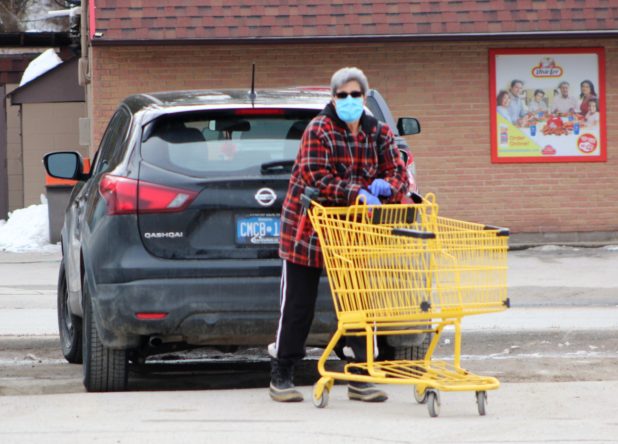Headline News
COVID-19 worsens existing crisis of affordability
March 24, 2020

March 24, 2020
By Nate Smelle
As observed in all communities throughout the province, day-to-day life has changed since the COVID-19 pandemic took hold in Ontario. Recognizing the impact COVID-19 is having on everyone, North Hastings Community Trust is now offering additional services and supports to make sure that those who are most vulnerable in the community do not fall through the cracks. While they are taking precautions to limit the number of people in their Bridge Street office at one-time, the Trust’s executive director Jane Kali said it is important that people in need of their assistance know that they are still open.
“We need to really be mindful that before the COVID-19 crisis people were in crisis, so people are even more isolated and have very limited access to services now – particularly with food and connections with other humans,” said Kali.
“A lot people we know may not know how to keep themselves safe, given the conditions they are living in. So we have been educating people when they come in, handing out sanitizers and soap; and also letting people know that they are not alone and that they can call us.” Kali added “Most places are closed down, so we are considering ourselves an essential service. Because the folks we see – thinking particularly about the people who don’t have housing – we know are living rough and they have nowhere to go.”
One of the most valuable lessons to arise from the COVID-19 crisis, explained Kali, is the importance of taking food insecurity seriously. With local restaurants, cafes and fast-food outlets closed, with the exception of the drive-thru, she said people are becoming even more isolated from one another, and therefore more at risk of going hungry. In an effort to make life easier and better for people during these uncertain times, Kali said the Trust recently started handing out free coffee and bagged lunches. Highlighting that now is a good time to start seedlings for the garden, she said the Trust is asking people to grow extra seedlings for the community gardens this year.
“Some people can’t afford to stock up on food, so they need to buy each day, and that’s scary,” said Kali.
“The other thing we are starting to think more about again is going back to growing our own food and increasing our capacity with the gardens, and our capacity as a community to look after ourselves with food … We have to step up our efforts, build greenhouses, look at aqua-ponics; this is going to really push us to move more quickly with making sure everyone is fed.”
Another issue Kali said the Trust is concerned about is the Town of Bancroft’s high water/wastewater rates. Acknowledging how even prior to the onset of COVID-19 it was still an issue for a lot of people in Bancroft to keep up with their water bills, and that people are being told to stay home, practice good hygiene, and wash their hands more frequently, she said the current situation will only make things more difficult. For people that are struggling to pay high water bills in Bancroft, she said the town needs to consider either waiving fees or reducing fees during this time.
“All levels of government need to be thinking more equitably,” Kali said. “They talk a lot about flattening the curve, but I am thinking about all those people who are under the curve. I am not hearing messages from any level of government around the housing crisis, issues around homelessness, the opioid crisis. All those things that were there before are still there, and they are now going to be worse.”
Acknowledging that water/wastewater bills are only one of many challenges that local residents are facing, Bancroft’s Mayor Paul Jenkins said because the situation is rapidly changing “we all need to adapt as more information comes forward.” He added that the town has already taken short-term internal measures, and is currently in the process of developing measures for the next stage of the crisis.
“We have informed Community Trust that we will be flexible and deal with situations on a case by case basis. We are waiting to see what aid my be coming from the upper levels of government, so we can work with community partners to develop a coordinated effort to supply the essentials of life to our citizens. As the majority of social services are centred in Bancroft, our service groups are seeing demand from all of North Hastings. This situation is a regional issue and will require support from all corners of the region.”
In order to make sure that everyone’s basic needs are met, the Trust has put together a list items in need, and ways for people to help them better serve the community. This list includes:
• Food (dried, canned and frozen) for the Trust’s Food Share program
• People to help prepare bagged lunches in the kitchen at St. Paul’s United Church in Bancroft on Tuesdays between 11 a.m. and noon
• People to help coordinate larger efforts that will happen in the future
• Money to purchase food for the bagged lunches, and/or specific food needed (granola bars, puddings, juice boxes, brown lunch size bags, bread, sandwich fixings, and treats)
• Hopeful messages (secular), “fortunes,” jokes, or treasures (i.e. origami animals) to include in bagged lunches
• Seedlings to share with the community gardens
• Getting in touch with each other and staying connected.
• Making individual and community art, poetry, reflection, and other creative projects
To find out more about how to access the the North Hastings Community Trust’s support, or to help, call: at 613 332-3657; or email: [email protected].

















